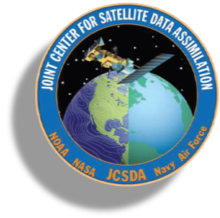The Joint Center for Satellite Data Assimilation (JCSDA) is pleased to announce the public, open-source release of the Community Radiative Transfer Model (CRTM) version 2.4.0 on October 28, 2020. The CRTM was recently featured in the UFS quarterly newsletter as an exemplar of community collaboration and engagement over many years with contributions from researchers spanning multiple federal agencies, universities, and other domestic and international research institutes.
CRTM Vision, Objectives, and Capabilities
The CRTM serves a critical role in making the best use of the billions of dollars spent on earth-observing satellites for operational data assimilation, calibration and validation, post-processing applications, and radiative transfer teaching. Its two primary objectives are to a) accurately simulate satellite-based radiances (radiance simulator), and b) compute the radiance sensitivity to a change in the atmospheric/surface state (radiance Jacobian).
The CRTM software package can be run on a variety of platforms from laptops to supercomputers. CRTM can also readily accommodate new input tables for clouds, aerosols, and surface properties in support of current and future observation systems. Community contributions are highly encouraged, and will be managed through JCSDA public GitHub repository and automatic testing framework.
CRTM Release 2.4.0 Key Features
CRTM release 2.4.0 contains a host of new features, while still supporting all prior satellite systems:
Backwards interface compatibility with CRTM v2.3.0 (current operational version).
Support for upcoming and updated sensors: Earth Observing Nanosatellite-Microwave, Sentinel-3A Sea and Land Surface Temperature (SLSTR), Meteosat-11 SEVIRI, GOES 17 ABI, Metop-C AVHRR and IASI, Soil Moisture Anisotropy Probe (SMAP), Soil Moisture Ocean Salinity (SMOS), Temporal Experiment for Storms and Tropical Systems - Demonstration (TEMPEST-D), MI-L COMS, FY4-GIIRS, TROPICS, and many more under development.
Expanded scattering tables for more physically realistic cloud and precipitation simulations. Additional optional aerosol species from the CMAQ model. Enhanced physical consistency between CRTM and model microphysics (i.e., GFDL, Thompson, and WSM6).
(User Option) Multi-threaded parallelization using OpenMP directives: enables improved wall-clock performance. Improved loop-level performance with code optimizations.
(User Option) netCDFv4 file formats for cloud and aerosol lookup tables, instead of the current binary format files.
The CRTM release 2.4.0 package will contain the following:
Source code, run scripts, binary files, and configuration files on publicly accessible JCSDA Github repository, under the Creative Commons Zero (CC0) license.
Release documentation including instructions on building and installing the CRTM library, stand-alone code examples, release notes, and multiple technical tutorials.
More comprehensive documentation covering specific technical features and tutorials will be added in the weeks following the release.
Support
The CRTM is developed, maintained, distributed, and supported by the JCSDA, a multi-agency research center with its operations hosted by the University Corporation for Atmospheric Research (UCAR). Support for development, testing, and evaluation of the CRTM model includes integration assistance, troubleshooting, bug fixes, scientific/technical inquiries, and requests for new sensor support. Communication is available through JCSDA Forums.
Community Modeling Engagement
The community will be able to access the latest release 2.4.0, prior releases of the code (v2.2.3, v2.3.0), as well as the latest CRTM developments via the Github-hosted repository master and develop branches respectively. As soon as CRTM v2.4.0 is released, community users are encouraged to engage in agile development on GitHub, utilizing the support forums for questions as needed. Code contributions are regulated through a peer review mechanism to ensure that the high quality of the CRTM code base is maintained.
Information About JCSDA Releases
Make sure to subscribe to JCSDA News mailing list for release updates, bug fixes, and new release announcements.

